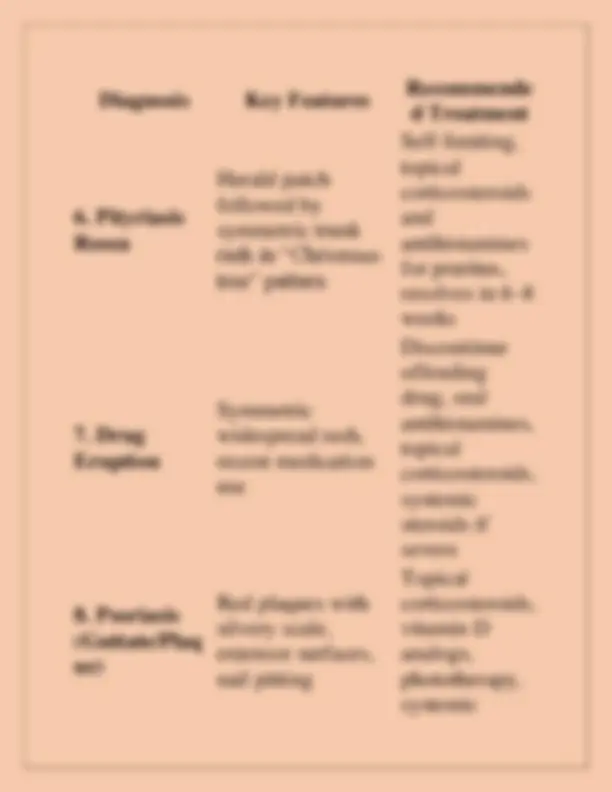Download Comprehensive Case Analysis: A 25-Year-Old Male With Pruritic Rash – Diagnostic Reasoning and more Exams Integrated Case Studies in PDF only on Docsity!
Comprehensive Case Analysis: A 25-Year-Old Male With Pruritic Rash – Diagnostic Reasoning and Management in Primary Care; Skin Problem Class 6512 Week #4 Full Actual Assignment With All Screenshots
Here is the detailed History and HPI (History of Present Illness) section tailored for your Week 4 I- Human Case – 25 - Year-Old Male With Pruritic Rash (Course 6512) : History Patient Name: [Confidential] Age: 25 Sex: Male Occupation: Landscaper Date of Visit: [Insert Date] Past Medical History (PMH):
- No known chronic conditions
- No prior similar skin issues
- No known autoimmune or dermatologic history Surgical History:
- None reported Medications:
- None currently
Allergies:
- No known drug allergies (NKDA) Family History:
- No family history of psoriasis, eczema, or skin cancer
- No family history of autoimmune diseases Social History:
- Occupation: Works full-time outdoors as a landscaper
- Smoking: Denies
- Alcohol: Drinks occasionally (socially)
- Recreational drugs: Denies
- Living situation: Lives alone; no recent changes in residence
- Sexual activity: Sexually active, uses protection History of Present Illness (HPI) CC: “I have this itchy rash on my arms and chest.” The patient is a 25-year-old male presenting with a 3 - day history of a progressively worsening,
Subjective Chief Complaint (CC): "I have this itchy rash on my arms and chest." History of Present Illness (HPI): 25 - year-old male landscaper presents with a 3-day history of a rash on his forearms, chest, and upper thighs. The rash is pruritic, red, and appeared after working outdoors. He denies systemic symptoms (e.g., fever, fatigue), new skincare products, medications, or recent travel. Past Medical History (PMH): None Medications: None Allergies: No known drug allergies (NKDA) Family History (FH): Non-contributory Social History (SH):
- Occupation: Landscaper
- Smokes: No
- Alcohol: Occasional
- Illicit drugs: Denies
Review of Systems (ROS):
- Skin: Positive for pruritic rash
- Constitutional: Denies fever, chills, fatigue
- Respiratory/Cardiac/GI/Neuro: Denies symptoms Objective Vitals: WNL General: Alert, oriented, no acute distress Skin: Erythematous, linear vesicles and papules with excoriations on forearms, chest, and thighs. No signs of secondary infection. Lymph Nodes: No lymphadenopathy Other systems: Normal Assessment Differential Diagnoses Table:
Diagnosi s Onset Distribut ion Key Features Diagnos tics colored plaques Drug Eruption 1 - 2 weeks post-drug Symmetr ical trunk/lim bs Maculopap ular, possibly febrile Medicati on review, eosinoph ils Final Diagnosis: Allergic Contact Dermatitis (ACD) Plan
- Pharmacologic Treatment: o Triamcinolone 0.1% cream topically BID x 7 days o Cetirizine 10 mg PO daily for itching
- Non-Pharmacologic: o Avoid known irritants/allergens (e.g., poison ivy) o Wash skin/clothes immediately after outdoor exposure
- Diagnostics: o None immediately required unless non- resolving o Consider patch testing if recurrent
- Education: o Explain the cause of allergic dermatitis o Importance of skin protection during landscaping o When to return (e.g., worsening, signs of infection)
- Follow-up: 1 week; sooner if symptoms worsen Clinical Reflection This case reinforced the importance of environmental exposure history in dermatologic complaints. It emphasized pattern recognition (linear vesicles) and occupational risk (landscaping). I learned to consider scabies and tinea in the differential, but the exposure pattern and acute onset supported ACD. Learning Objectives
export default function SkinCaseWeek4() { return (
Comprehensive Case Analysis: A 25-Year-Old Male With Pruritic Rash
NRNP 6512 – Week 4 | Diagnostic Reasoning and Management in Primary Care
1. Case Introduction
25-year-old male landscaper presents with a 3-day history of a pruritic rash on arms, chest, and thighs.
2. Chief Complaint
"I have this itchy rash on my arms and chest."
3. History & Risk Factors
- Outdoor exposure (landscaper)
- No new medications or products
- No systemic symptoms
5. Differential Diagnoses
ACD, Irritant Dermatitis, Scabies, Tinea Corporis, Pityriasis Rosea, Drug Eruption
6. Final Diagnosis
Allergic Contact Dermatitis (ACD) – based on exposure history, distribution, and morphology.
7. Treatment Plan
- Topical corticosteroids (Triamcinolone 0.1%)
- Oral antihistamines (Cetirizine 10 mg)
8. Patient Education
- Avoid allergen (e.g., poison ivy)
- Immediate washing of skin and clothes
- Signs of worsening or infection
Deliver focused dermatologic education 11. References
- Bolognia, J. L., et al. (2022). Dermatology (5th ed.). Elsevier.
- Habif, T. P. (2021). Clinical Dermatology (6th ed.). Elsevier.
- Woo, T. M., & Robinson, M. V. (2020). Pharmacotherapeutics (5th ed.). F.A. Davis.
- Ball, J. W., et al. (2023). Seidel's Guide to Physical Examination (10th ed.). Elsevier.
- American Academy of Dermatology. (n.d.). Contact dermatitis. https://www.aad.org/public/diseases/rashes/conta ct-dermatitis
); }Certainly! Here's an **expanded list of additional differential diagnoses and corresponding treatments** relevant to your **Week 4 I-Human case: 25 - year-old male with pruritic rash** , especially when the clinical picture is not immediately clear. **Expanded Differential Diagnoses and Treatments**
































































